New Grad Nurse Resume Examples

Jul 18, 2024
|
12 min read
Crafting your new grad nurse resume: tips for a healthy start to your career. How to heal your resume and make it stand out in the healthcare field.
Rated by 348 people
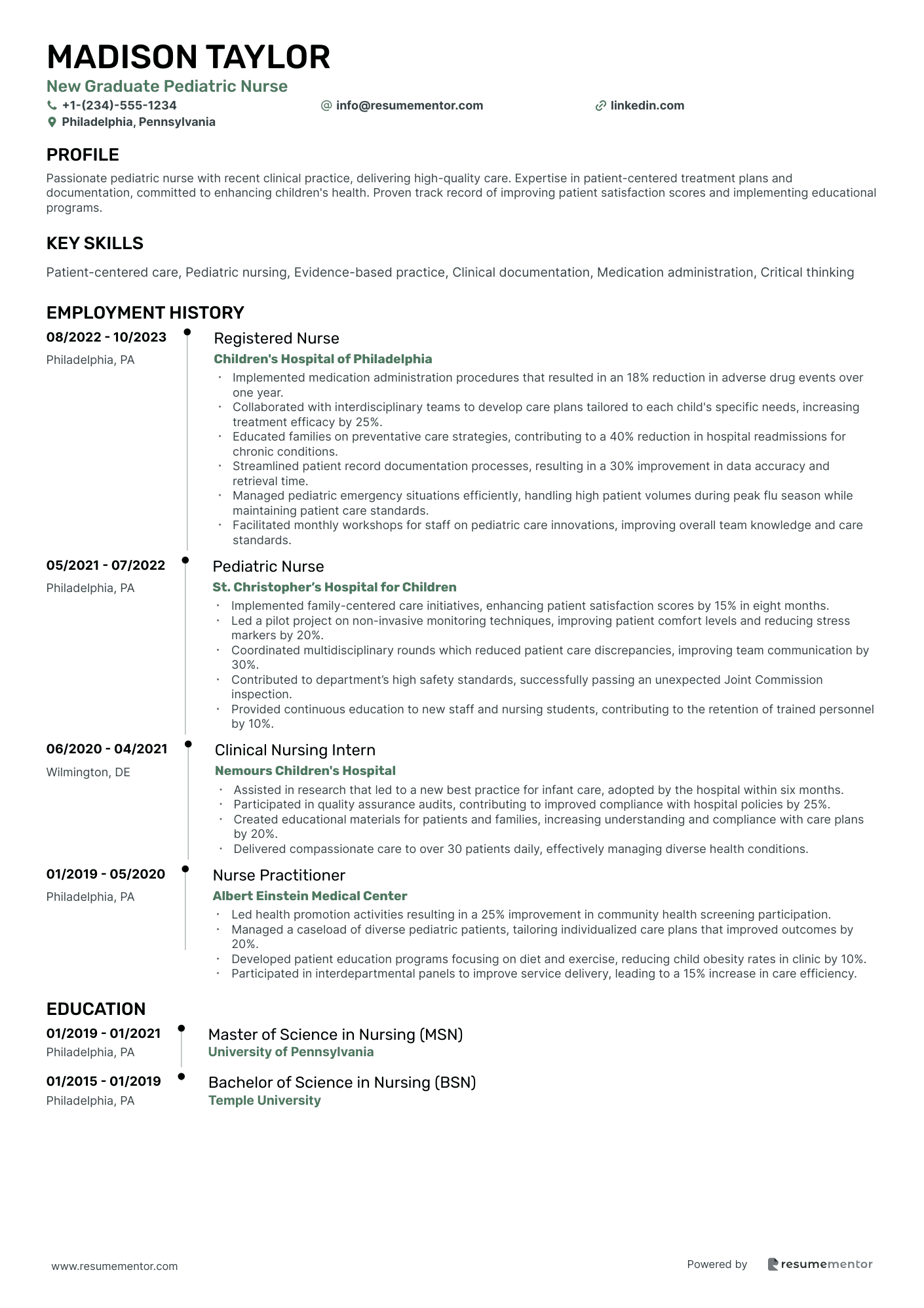
New Graduate Pediatric Nurse
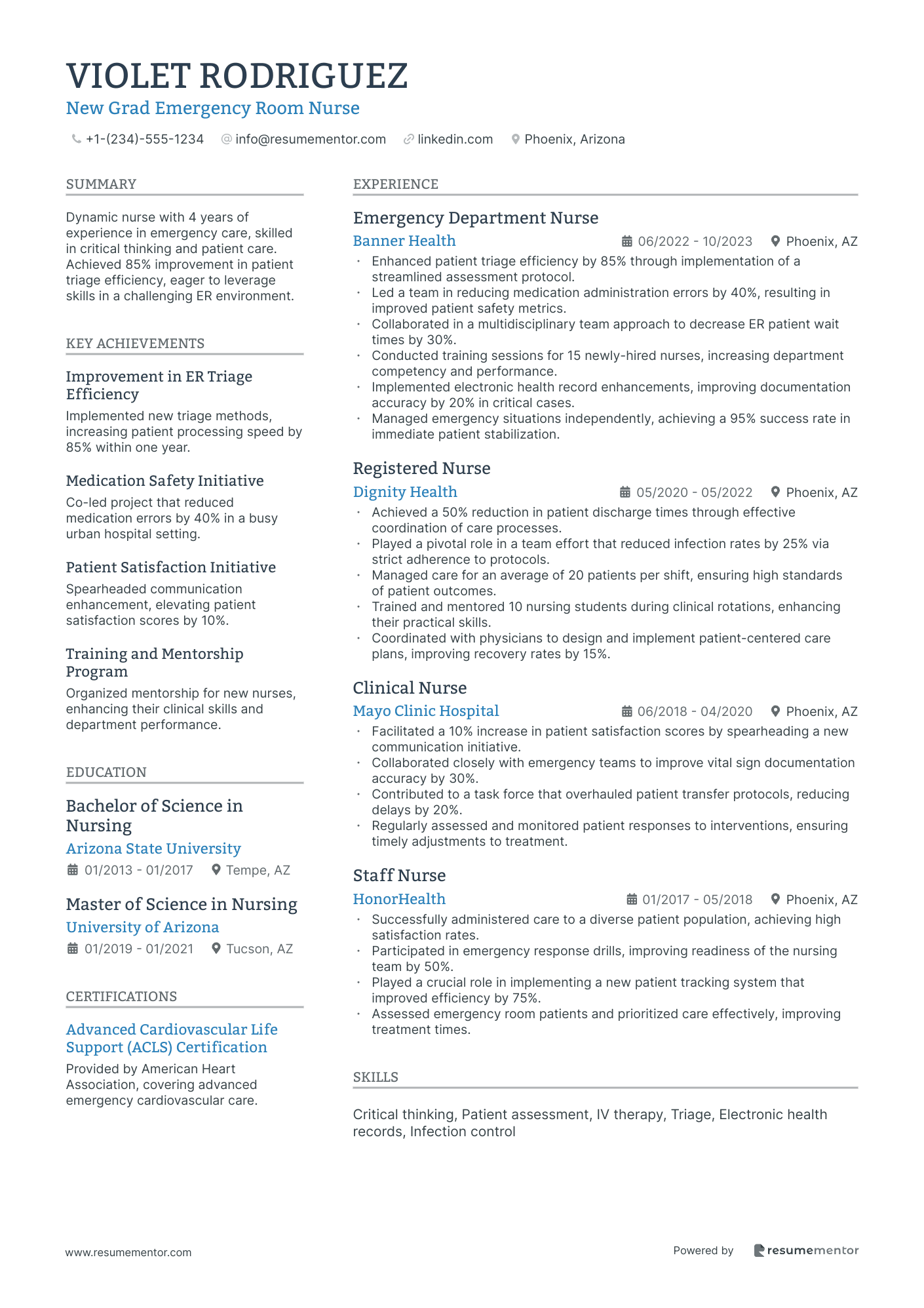
New Grad Emergency Room Nurse
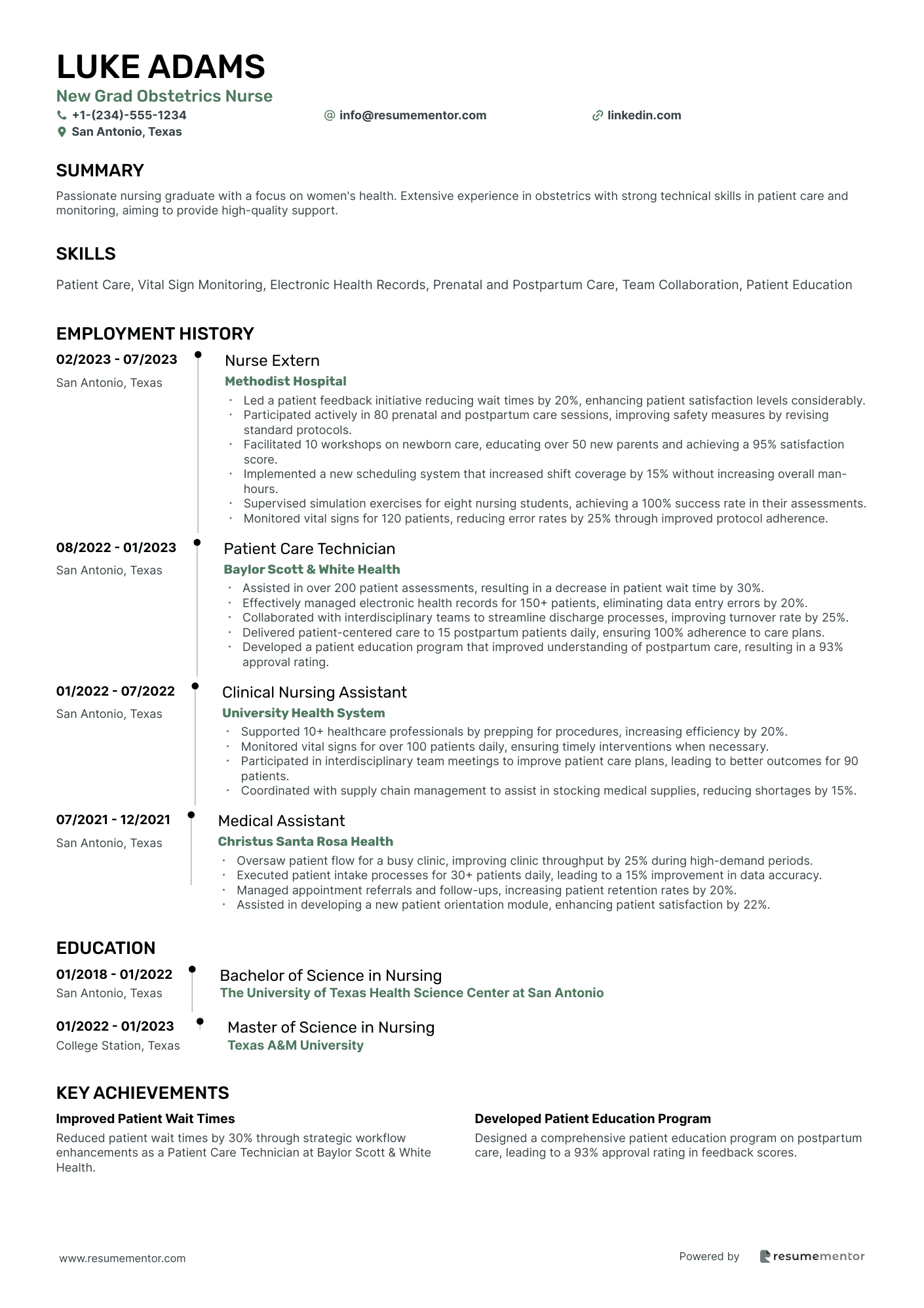
New Grad Obstetrics Nurse
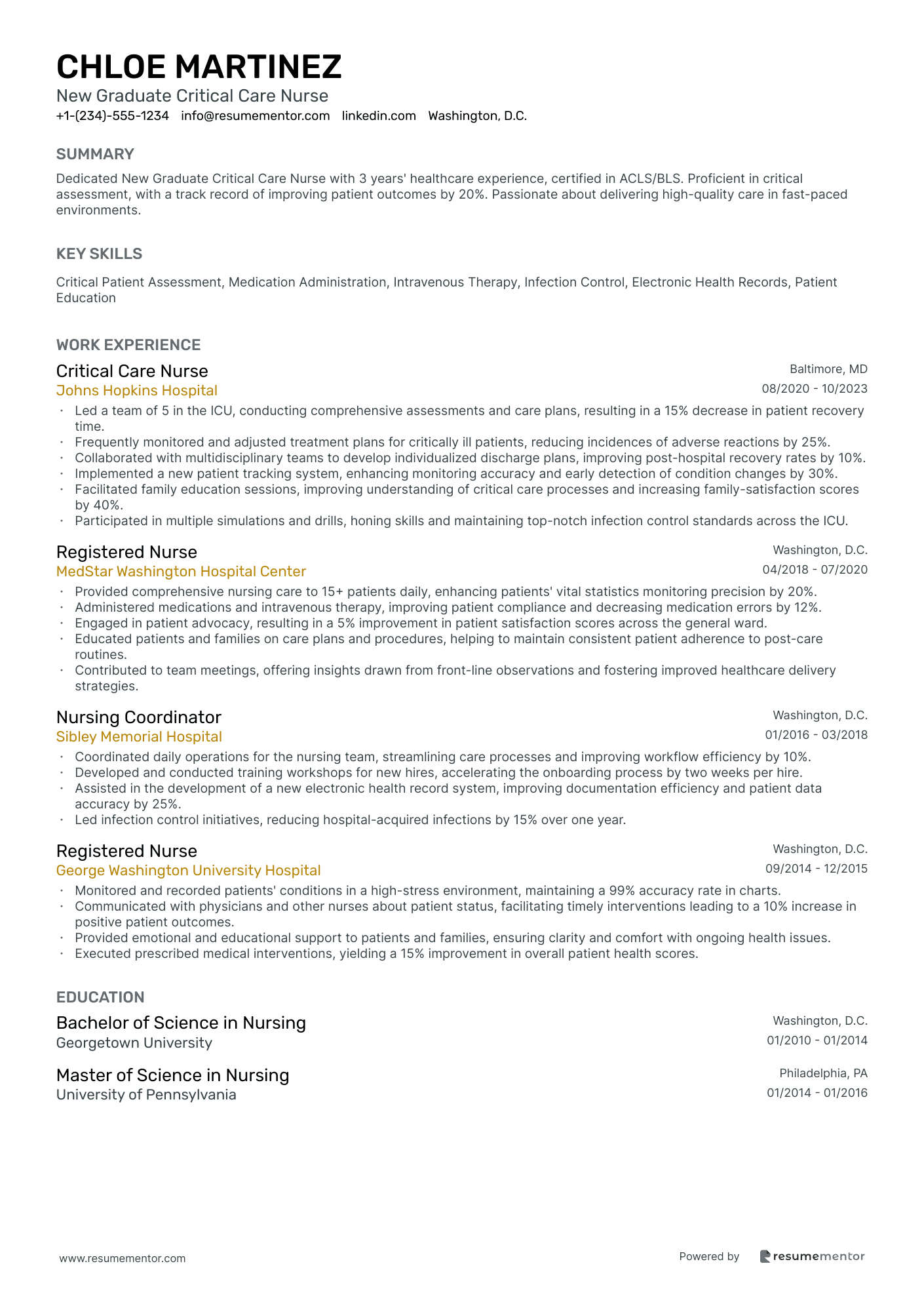
New Graduate Critical Care Nurse
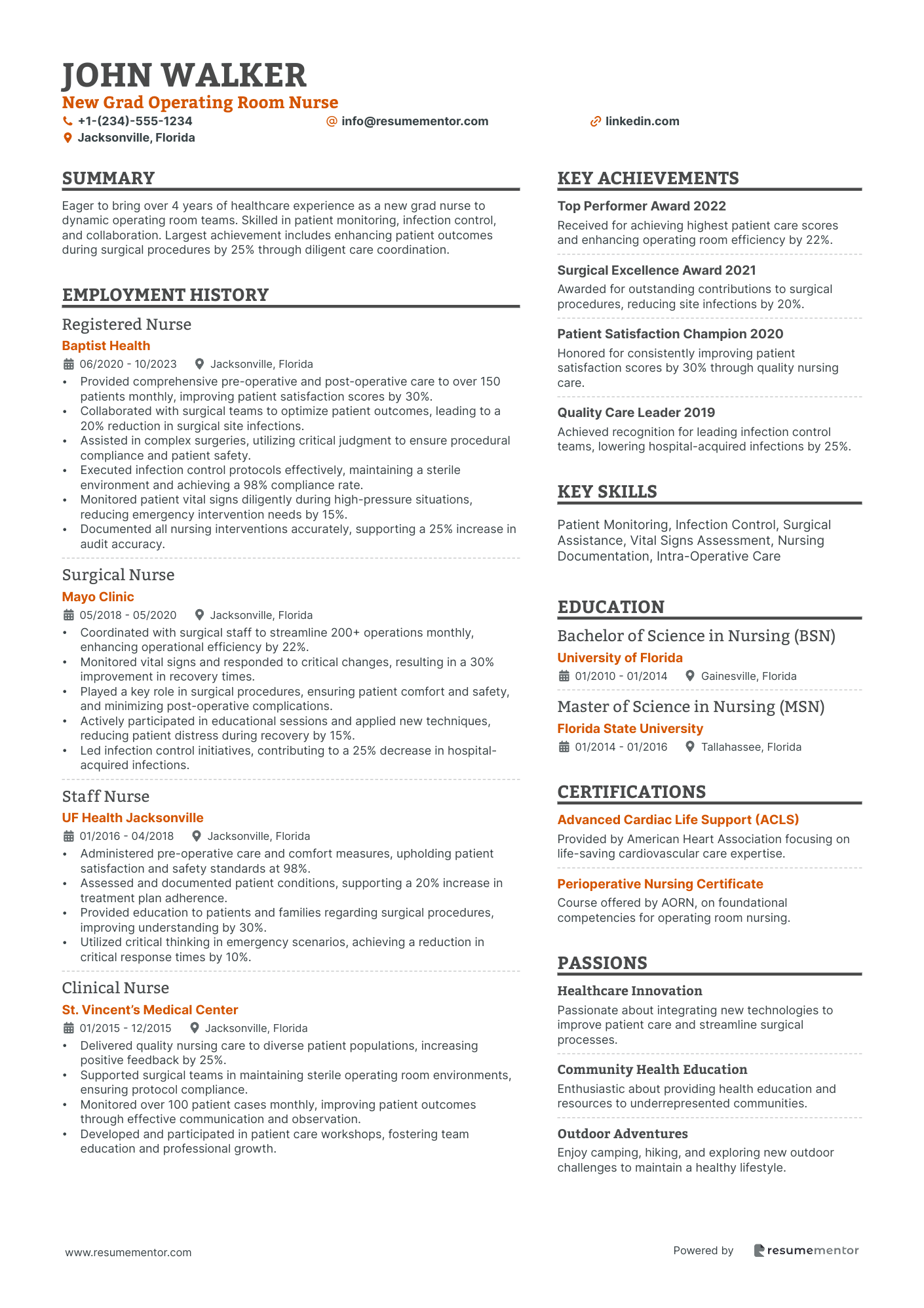
New Grad Operating Room Nurse
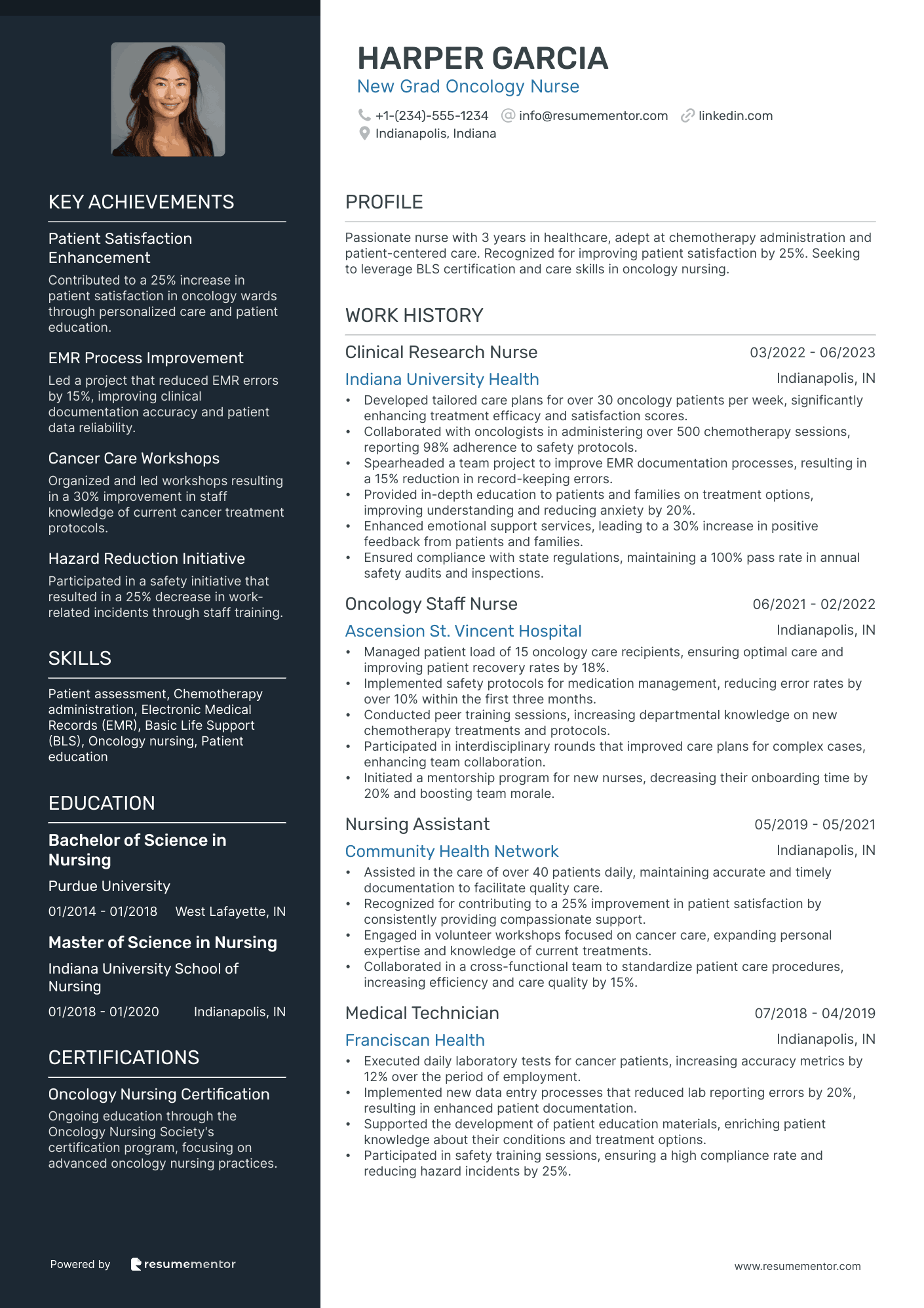
New Grad Oncology Nurse
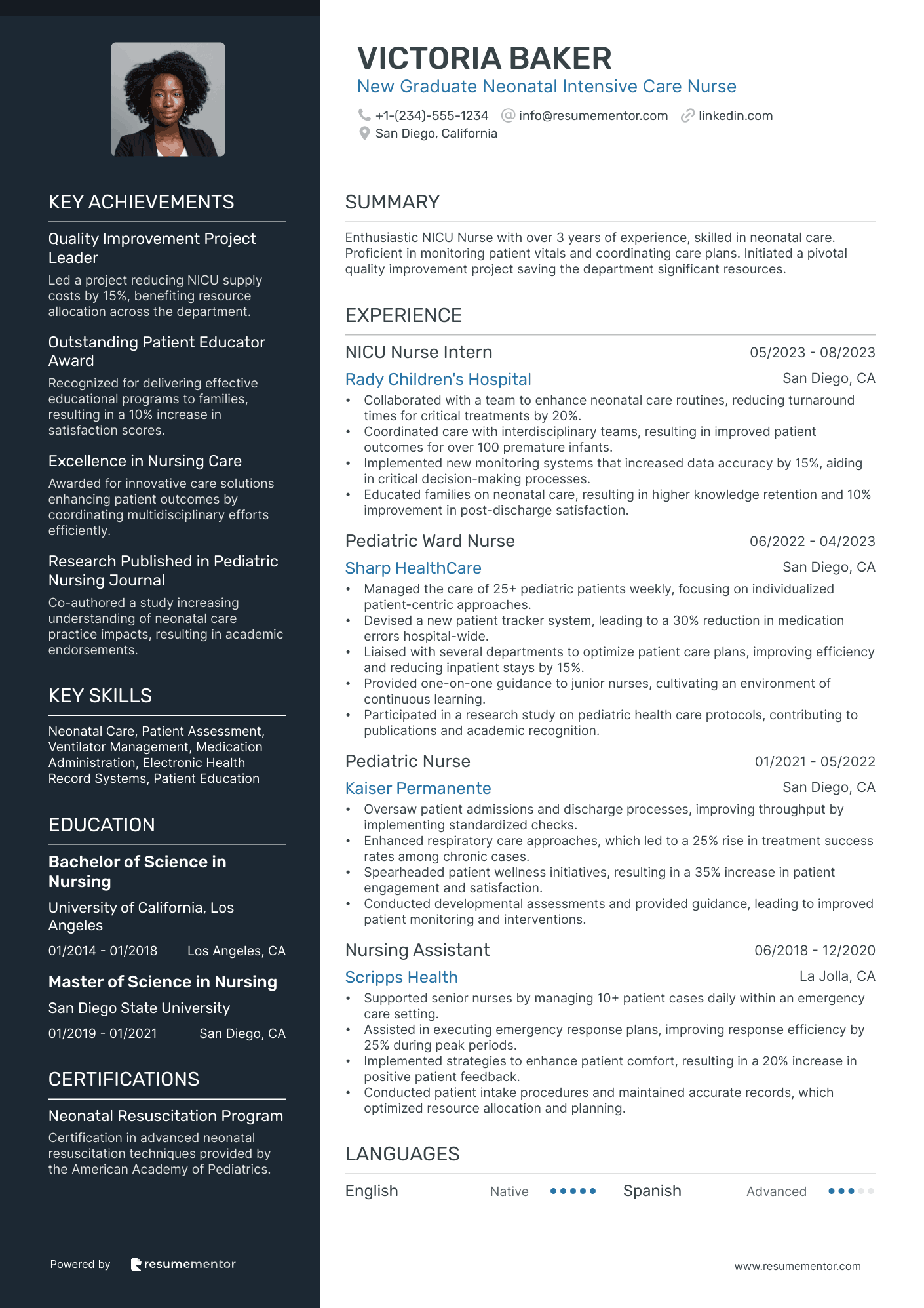
New Graduate Neonatal Intensive Care Nurse
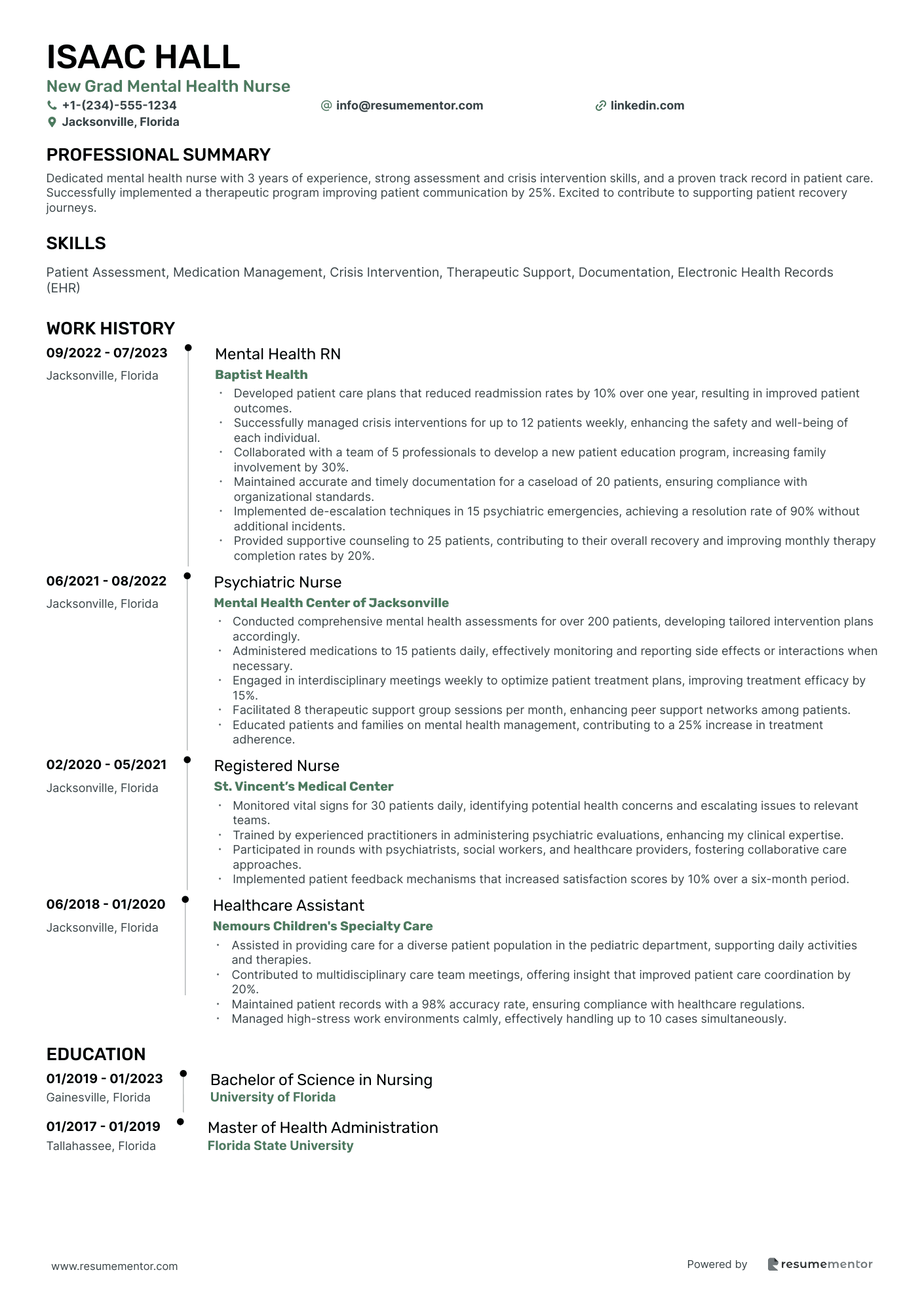
New Grad Mental Health Nurse
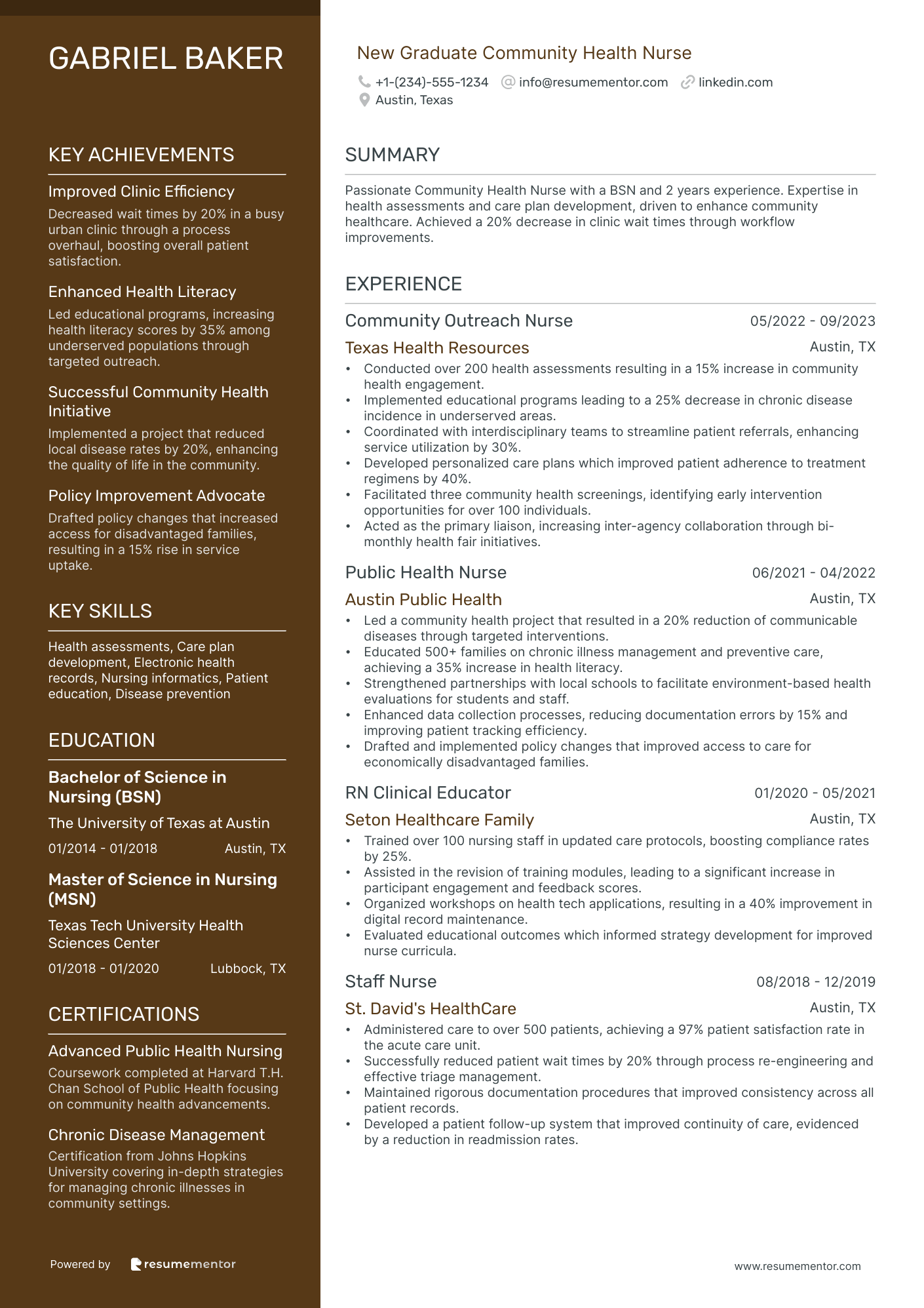
New Graduate Community Health Nurse

New Graduate Pediatric Nurse resume sample
- •Implemented medication administration procedures that resulted in an 18% reduction in adverse drug events over one year.
- •Collaborated with interdisciplinary teams to develop care plans tailored to each child's specific needs, increasing treatment efficacy by 25%.
- •Educated families on preventative care strategies, contributing to a 40% reduction in hospital readmissions for chronic conditions.
- •Streamlined patient record documentation processes, resulting in a 30% improvement in data accuracy and retrieval time.
- •Managed pediatric emergency situations efficiently, handling high patient volumes during peak flu season while maintaining patient care standards.
- •Facilitated monthly workshops for staff on pediatric care innovations, improving overall team knowledge and care standards.
- •Implemented family-centered care initiatives, enhancing patient satisfaction scores by 15% in eight months.
- •Led a pilot project on non-invasive monitoring techniques, improving patient comfort levels and reducing stress markers by 20%.
- •Coordinated multidisciplinary rounds which reduced patient care discrepancies, improving team communication by 30%.
- •Contributed to department’s high safety standards, successfully passing an unexpected Joint Commission inspection.
- •Provided continuous education to new staff and nursing students, contributing to the retention of trained personnel by 10%.
- •Assisted in research that led to a new best practice for infant care, adopted by the hospital within six months.
- •Participated in quality assurance audits, contributing to improved compliance with hospital policies by 25%.
- •Created educational materials for patients and families, increasing understanding and compliance with care plans by 20%.
- •Delivered compassionate care to over 30 patients daily, effectively managing diverse health conditions.
- •Led health promotion activities resulting in a 25% improvement in community health screening participation.
- •Managed a caseload of diverse pediatric patients, tailoring individualized care plans that improved outcomes by 20%.
- •Developed patient education programs focusing on diet and exercise, reducing child obesity rates in clinic by 10%.
- •Participated in interdepartmental panels to improve service delivery, leading to a 15% increase in care efficiency.
New Grad Emergency Room Nurse resume sample
- •Enhanced patient triage efficiency by 85% through implementation of a streamlined assessment protocol.
- •Led a team in reducing medication administration errors by 40%, resulting in improved patient safety metrics.
- •Collaborated in a multidisciplinary team approach to decrease ER patient wait times by 30%.
- •Conducted training sessions for 15 newly-hired nurses, increasing department competency and performance.
- •Implemented electronic health record enhancements, improving documentation accuracy by 20% in critical cases.
- •Managed emergency situations independently, achieving a 95% success rate in immediate patient stabilization.
- •Achieved a 50% reduction in patient discharge times through effective coordination of care processes.
- •Played a pivotal role in a team effort that reduced infection rates by 25% via strict adherence to protocols.
- •Managed care for an average of 20 patients per shift, ensuring high standards of patient outcomes.
- •Trained and mentored 10 nursing students during clinical rotations, enhancing their practical skills.
- •Coordinated with physicians to design and implement patient-centered care plans, improving recovery rates by 15%.
- •Facilitated a 10% increase in patient satisfaction scores by spearheading a new communication initiative.
- •Collaborated closely with emergency teams to improve vital sign documentation accuracy by 30%.
- •Contributed to a task force that overhauled patient transfer protocols, reducing delays by 20%.
- •Regularly assessed and monitored patient responses to interventions, ensuring timely adjustments to treatment.
- •Successfully administered care to a diverse patient population, achieving high satisfaction rates.
- •Participated in emergency response drills, improving readiness of the nursing team by 50%.
- •Played a crucial role in implementing a new patient tracking system that improved efficiency by 75%.
- •Assessed emergency room patients and prioritized care effectively, improving treatment times.
New Grad Obstetrics Nurse resume sample
- •Led a patient feedback initiative reducing wait times by 20%, enhancing patient satisfaction levels considerably.
- •Participated actively in 80 prenatal and postpartum care sessions, improving safety measures by revising standard protocols.
- •Facilitated 10 workshops on newborn care, educating over 50 new parents and achieving a 95% satisfaction score.
- •Implemented a new scheduling system that increased shift coverage by 15% without increasing overall man-hours.
- •Supervised simulation exercises for eight nursing students, achieving a 100% success rate in their assessments.
- •Monitored vital signs for 120 patients, reducing error rates by 25% through improved protocol adherence.
- •Assisted in over 200 patient assessments, resulting in a decrease in patient wait time by 30%.
- •Effectively managed electronic health records for 150+ patients, eliminating data entry errors by 20%.
- •Collaborated with interdisciplinary teams to streamline discharge processes, improving turnover rate by 25%.
- •Delivered patient-centered care to 15 postpartum patients daily, ensuring 100% adherence to care plans.
- •Developed a patient education program that improved understanding of postpartum care, resulting in a 93% approval rating.
- •Supported 10+ healthcare professionals by prepping for procedures, increasing efficiency by 20%.
- •Monitored vital signs for over 100 patients daily, ensuring timely interventions when necessary.
- •Participated in interdisciplinary team meetings to improve patient care plans, leading to better outcomes for 90 patients.
- •Coordinated with supply chain management to assist in stocking medical supplies, reducing shortages by 15%.
- •Oversaw patient flow for a busy clinic, improving clinic throughput by 25% during high-demand periods.
- •Executed patient intake processes for 30+ patients daily, leading to a 15% improvement in data accuracy.
- •Managed appointment referrals and follow-ups, increasing patient retention rates by 20%.
- •Assisted in developing a new patient orientation module, enhancing patient satisfaction by 22%.
New Graduate Critical Care Nurse resume sample
- •Led a team of 5 in the ICU, conducting comprehensive assessments and care plans, resulting in a 15% decrease in patient recovery time.
- •Frequently monitored and adjusted treatment plans for critically ill patients, reducing incidences of adverse reactions by 25%.
- •Collaborated with multidisciplinary teams to develop individualized discharge plans, improving post-hospital recovery rates by 10%.
- •Implemented a new patient tracking system, enhancing monitoring accuracy and early detection of condition changes by 30%.
- •Facilitated family education sessions, improving understanding of critical care processes and increasing family-satisfaction scores by 40%.
- •Participated in multiple simulations and drills, honing skills and maintaining top-notch infection control standards across the ICU.
- •Provided comprehensive nursing care to 15+ patients daily, enhancing patients' vital statistics monitoring precision by 20%.
- •Administered medications and intravenous therapy, improving patient compliance and decreasing medication errors by 12%.
- •Engaged in patient advocacy, resulting in a 5% improvement in patient satisfaction scores across the general ward.
- •Educated patients and families on care plans and procedures, helping to maintain consistent patient adherence to post-care routines.
- •Contributed to team meetings, offering insights drawn from front-line observations and fostering improved healthcare delivery strategies.
- •Coordinated daily operations for the nursing team, streamlining care processes and improving workflow efficiency by 10%.
- •Developed and conducted training workshops for new hires, accelerating the onboarding process by two weeks per hire.
- •Assisted in the development of a new electronic health record system, improving documentation efficiency and patient data accuracy by 25%.
- •Led infection control initiatives, reducing hospital-acquired infections by 15% over one year.
- •Monitored and recorded patients' conditions in a high-stress environment, maintaining a 99% accuracy rate in charts.
- •Communicated with physicians and other nurses about patient status, facilitating timely interventions leading to a 10% increase in positive patient outcomes.
- •Provided emotional and educational support to patients and families, ensuring clarity and comfort with ongoing health issues.
- •Executed prescribed medical interventions, yielding a 15% improvement in overall patient health scores.
New Grad Operating Room Nurse resume sample
- •Provided comprehensive pre-operative and post-operative care to over 150 patients monthly, improving patient satisfaction scores by 30%.
- •Collaborated with surgical teams to optimize patient outcomes, leading to a 20% reduction in surgical site infections.
- •Assisted in complex surgeries, utilizing critical judgment to ensure procedural compliance and patient safety.
- •Executed infection control protocols effectively, maintaining a sterile environment and achieving a 98% compliance rate.
- •Monitored patient vital signs diligently during high-pressure situations, reducing emergency intervention needs by 15%.
- •Documented all nursing interventions accurately, supporting a 25% increase in audit accuracy.
- •Coordinated with surgical staff to streamline 200+ operations monthly, enhancing operational efficiency by 22%.
- •Monitored vital signs and responded to critical changes, resulting in a 30% improvement in recovery times.
- •Played a key role in surgical procedures, ensuring patient comfort and safety, and minimizing post-operative complications.
- •Actively participated in educational sessions and applied new techniques, reducing patient distress during recovery by 15%.
- •Led infection control initiatives, contributing to a 25% decrease in hospital-acquired infections.
- •Administered pre-operative care and comfort measures, upholding patient satisfaction and safety standards at 98%.
- •Assessed and documented patient conditions, supporting a 20% increase in treatment plan adherence.
- •Provided education to patients and families regarding surgical procedures, improving understanding by 30%.
- •Utilized critical thinking in emergency scenarios, achieving a reduction in critical response times by 10%.
- •Delivered quality nursing care to diverse patient populations, increasing positive feedback by 25%.
- •Supported surgical teams in maintaining sterile operating room environments, ensuring protocol compliance.
- •Monitored over 100 patient cases monthly, improving patient outcomes through effective communication and observation.
- •Developed and participated in patient care workshops, fostering team education and professional growth.
New Grad Oncology Nurse resume sample
- •Developed tailored care plans for over 30 oncology patients per week, significantly enhancing treatment efficacy and satisfaction scores.
- •Collaborated with oncologists in administering over 500 chemotherapy sessions, reporting 98% adherence to safety protocols.
- •Spearheaded a team project to improve EMR documentation processes, resulting in a 15% reduction in record-keeping errors.
- •Provided in-depth education to patients and families on treatment options, improving understanding and reducing anxiety by 20%.
- •Enhanced emotional support services, leading to a 30% increase in positive feedback from patients and families.
- •Ensured compliance with state regulations, maintaining a 100% pass rate in annual safety audits and inspections.
- •Managed patient load of 15 oncology care recipients, ensuring optimal care and improving patient recovery rates by 18%.
- •Implemented safety protocols for medication management, reducing error rates by over 10% within the first three months.
- •Conducted peer training sessions, increasing departmental knowledge on new chemotherapy treatments and protocols.
- •Participated in interdisciplinary rounds that improved care plans for complex cases, enhancing team collaboration.
- •Initiated a mentorship program for new nurses, decreasing their onboarding time by 20% and boosting team morale.
- •Assisted in the care of over 40 patients daily, maintaining accurate and timely documentation to facilitate quality care.
- •Recognized for contributing to a 25% improvement in patient satisfaction by consistently providing compassionate support.
- •Engaged in volunteer workshops focused on cancer care, expanding personal expertise and knowledge of current treatments.
- •Collaborated in a cross-functional team to standardize patient care procedures, increasing efficiency and care quality by 15%.
- •Executed daily laboratory tests for cancer patients, increasing accuracy metrics by 12% over the period of employment.
- •Implemented new data entry processes that reduced lab reporting errors by 20%, resulting in enhanced patient documentation.
- •Supported the development of patient education materials, enriching patient knowledge about their conditions and treatment options.
- •Participated in safety training sessions, ensuring a high compliance rate and reducing hazard incidents by 25%.
New Graduate Neonatal Intensive Care Nurse resume sample
- •Collaborated with a team to enhance neonatal care routines, reducing turnaround times for critical treatments by 20%.
- •Coordinated care with interdisciplinary teams, resulting in improved patient outcomes for over 100 premature infants.
- •Implemented new monitoring systems that increased data accuracy by 15%, aiding in critical decision-making processes.
- •Educated families on neonatal care, resulting in higher knowledge retention and 10% improvement in post-discharge satisfaction.
- •Managed the care of 25+ pediatric patients weekly, focusing on individualized patient-centric approaches.
- •Devised a new patient tracker system, leading to a 30% reduction in medication errors hospital-wide.
- •Liaised with several departments to optimize patient care plans, improving efficiency and reducing inpatient stays by 15%.
- •Provided one-on-one guidance to junior nurses, cultivating an environment of continuous learning.
- •Participated in a research study on pediatric health care protocols, contributing to publications and academic recognition.
- •Oversaw patient admissions and discharge processes, improving throughput by implementing standardized checks.
- •Enhanced respiratory care approaches, which led to a 25% rise in treatment success rates among chronic cases.
- •Spearheaded patient wellness initiatives, resulting in a 35% increase in patient engagement and satisfaction.
- •Conducted developmental assessments and provided guidance, leading to improved patient monitoring and interventions.
- •Supported senior nurses by managing 10+ patient cases daily within an emergency care setting.
- •Assisted in executing emergency response plans, improving response efficiency by 25% during peak periods.
- •Implemented strategies to enhance patient comfort, resulting in a 20% increase in positive patient feedback.
- •Conducted patient intake procedures and maintained accurate records, which optimized resource allocation and planning.
New Grad Mental Health Nurse resume sample
- •Developed patient care plans that reduced readmission rates by 10% over one year, resulting in improved patient outcomes.
- •Successfully managed crisis interventions for up to 12 patients weekly, enhancing the safety and well-being of each individual.
- •Collaborated with a team of 5 professionals to develop a new patient education program, increasing family involvement by 30%.
- •Maintained accurate and timely documentation for a caseload of 20 patients, ensuring compliance with organizational standards.
- •Implemented de-escalation techniques in 15 psychiatric emergencies, achieving a resolution rate of 90% without additional incidents.
- •Provided supportive counseling to 25 patients, contributing to their overall recovery and improving monthly therapy completion rates by 20%.
- •Conducted comprehensive mental health assessments for over 200 patients, developing tailored intervention plans accordingly.
- •Administered medications to 15 patients daily, effectively monitoring and reporting side effects or interactions when necessary.
- •Engaged in interdisciplinary meetings weekly to optimize patient treatment plans, improving treatment efficacy by 15%.
- •Facilitated 8 therapeutic support group sessions per month, enhancing peer support networks among patients.
- •Educated patients and families on mental health management, contributing to a 25% increase in treatment adherence.
- •Monitored vital signs for 30 patients daily, identifying potential health concerns and escalating issues to relevant teams.
- •Trained by experienced practitioners in administering psychiatric evaluations, enhancing my clinical expertise.
- •Participated in rounds with psychiatrists, social workers, and healthcare providers, fostering collaborative care approaches.
- •Implemented patient feedback mechanisms that increased satisfaction scores by 10% over a six-month period.
- •Assisted in providing care for a diverse patient population in the pediatric department, supporting daily activities and therapies.
- •Contributed to multidisciplinary care team meetings, offering insight that improved patient care coordination by 20%.
- •Maintained patient records with a 98% accuracy rate, ensuring compliance with healthcare regulations.
- •Managed high-stress work environments calmly, effectively handling up to 10 cases simultaneously.
New Graduate Community Health Nurse resume sample
- •Conducted over 200 health assessments resulting in a 15% increase in community health engagement.
- •Implemented educational programs leading to a 25% decrease in chronic disease incidence in underserved areas.
- •Coordinated with interdisciplinary teams to streamline patient referrals, enhancing service utilization by 30%.
- •Developed personalized care plans which improved patient adherence to treatment regimens by 40%.
- •Facilitated three community health screenings, identifying early intervention opportunities for over 100 individuals.
- •Acted as the primary liaison, increasing inter-agency collaboration through bi-monthly health fair initiatives.
- •Led a community health project that resulted in a 20% reduction of communicable diseases through targeted interventions.
- •Educated 500+ families on chronic illness management and preventive care, achieving a 35% increase in health literacy.
- •Strengthened partnerships with local schools to facilitate environment-based health evaluations for students and staff.
- •Enhanced data collection processes, reducing documentation errors by 15% and improving patient tracking efficiency.
- •Drafted and implemented policy changes that improved access to care for economically disadvantaged families.
- •Trained over 100 nursing staff in updated care protocols, boosting compliance rates by 25%.
- •Assisted in the revision of training modules, leading to a significant increase in participant engagement and feedback scores.
- •Organized workshops on health tech applications, resulting in a 40% improvement in digital record maintenance.
- •Evaluated educational outcomes which informed strategy development for improved nurse curricula.
- •Administered care to over 500 patients, achieving a 97% patient satisfaction rate in the acute care unit.
- •Successfully reduced patient wait times by 20% through process re-engineering and effective triage management.
- •Maintained rigorous documentation procedures that improved consistency across all patient records.
- •Developed a patient follow-up system that improved continuity of care, evidenced by a reduction in readmission rates.
Starting your journey as a new grad nurse is like stepping onto a promising path in healthcare, where your resume becomes the key to unlocking opportunities. You might feel overwhelmed trying to translate your medical expertise and compassion into a document that captures your skills and potential. This feeling is common, particularly when you wonder how to highlight your achievements with limited work experience.
Creating a standout resume is crucial, as it not only presents your educational background but also showcases your dedication, empathy, and eagerness to learn. Choosing the right resume template can make this task easier. With a resume template, you can structure your information effectively, ensuring you include all the essential details future employers are looking for.
Focusing on what makes you unique is key. For a new grad nurse, this often means highlighting clinical rotations and any hands-on experience you gained during your studies. When you combine these elements with a polished format, your resume will become more enticing to potential employers. This approach helps convey your readiness and enthusiasm to step into your role as a caregiver.
Let this guide illuminate the process of organizing your experiences and aspirations into a powerful resume. With the right strategy, your resume can stand out and open doors to exciting opportunities in your nursing career.
Key Takeaways
- When writing a new grad nurse resume, focus on communicating your dedication to quality patient care and readiness to thrive in a clinical setting by detailing your education, skills, and hands-on nursing experience.
- Choosing an appropriate resume format, like a functional one, helps highlight your skills and education, particularly before gaining extensive work experience, while modern fonts contribute to a professional appearance.
- In your experience section, highlight recent and relevant achievements from clinical rotations and internships, using powerful action words and structuring the content in reverse chronological order for clarity.
- A resume summary should briefly capture your education, hands-on experience, standout strengths, and readiness for a healthcare role, using action-oriented language to create an energetic impression.
- Your skills section is crucial, acting as vital resume keywords that can include both hard skills (e.g., patient care techniques) and soft skills (e.g., empathy), ensuring your resume stands out to hiring managers.
What to focus on when writing your new grad nurse resume
Your new grad nurse resume should convey your dedication to quality patient care and highlight your readiness to flourish in a clinical setting. By showcasing your education, skills, and hands-on nursing experience, you can demonstrate your passion for the field and how prepared you are to make a difference in healthcare.
How to structure your new grad nurse resume
- Contact Information: Start with your full name, phone number, email address, and LinkedIn profile. This ensures recruiters can easily reach out and connect with you. Double-check for accuracy to avoid missing potential opportunities.
- Objective Statement: Clearly express your career goals and passion for nursing. This section sets the tone, illustrating your commitment to patient care and your ability to work well in a team. Tailor it to each position to show you’ve done your homework on the employer’s needs.
- Education: Detail your nursing degree, school name, and graduation date. Be sure to highlight any achievements or honors that underscore your dedication and skill in healthcare. Mentioning relevant coursework can add context to your academic background.
- Clinical Experience: Describe your clinical rotations, focusing on specialties and tasks where you excelled. Use bullet points to demonstrate your responsibilities and key procedures, showcasing your practical experience. Include specific settings like hospitals or clinics to give a fuller picture of your training.
- Skills: Emphasize nursing-specific skills like patient assessment, medication administration, and proficiency in electronic health records. Certifications such as BLS or ACLS further reinforce your qualifications. Highlight soft skills like communication and empathy, which are crucial in nursing.
- Volunteer Experience: Include relevant volunteer work in healthcare settings. This demonstrates your initiative and adds valuable depth to your practical experience. Volunteering in diverse environments can illustrate adaptability and cultural competence.
To further enhance your resume, consider adding optional sections like "Languages" if you're bilingual or "Professional Affiliations" such as memberships in nursing associations. These additional elements can help set you apart in the job market. Below we'll cover each section more in-depth, so you can ensure your resume format is impactful and aligned with your goals.
Which resume format to choose
As a new grad nurse, selecting the right resume format is vital in effectively presenting yourself to employers. A functional format is particularly beneficial because it allows you to emphasize your skills and education, which are key strengths when you may not have extensive work experience yet. This format ensures that what you bring to the table is highlighted effectively and catches the recruiter's eye.
When selecting fonts, you want to go for a modern and professional appearance that keeps your resume easy to read. Options like Raleway, Lato, or Montserrat not only look fresh but also lend a polished feel to your document. While fonts may seem minor, they contribute to the overall impression of your resume.
Saving your resume as a PDF is an essential step in the process. PDFs preserve the layout just as you intended, ensuring that your resume looks the same on any device or software. This keeps your document looking neat and professional, reinforcing the impression you wish to make.
Adequate margins, typically around one inch, are crucial for maintaining an organized and clean look. They help balance the text and white space, making your resume easier to read and aesthetically pleasing. Attention to these details is important for creating a positive impact on potential employers, demonstrating both your professionalism and attention to detail.
How to write a quantifiable resume experience section
Creating a standout experience section for your new grad nurse resume is crucial. Begin by highlighting the skills and achievements you gained from clinical rotations, internships, or jobs, allowing you to showcase your hands-on experience and eagerness to learn. To ensure clarity and relevance, structure this section in reverse chronological order, starting with your most recent experience. Focus on roles from the last 3-5 years that align with your nursing aspirations, and tailor this section to the job by incorporating keywords from the job ad. Using powerful action words like “assisted,” “administered,” “coordinated,” and “guided” helps make your accomplishments striking and active.
- •Assisted in care for more than 30 patients daily, enhancing comfort and chart accuracy.
- •Administered medication and managed IV therapy for over 15 patients without errors.
- •Collaborated with a multi-disciplinary team to ensure comprehensive care plans.
- •Documented patient interactions, boosting charting accuracy by 20%.
This experience section shines because it integrates your recent achievements in a way that feels relevant to potential roles. By reflecting specific contributions in each bullet point, it clearly shows your readiness for success in a healthcare setting. Tailored with care, it demonstrates the skills and results employers desire, making your qualifications compelling. The structured format includes clear dates, which enhance readability, while the dynamic use of action words ensures your experience feels engaging and professional. The flow effectively ties together your adaptability and eagerness to grow, painting a complete picture of your potential as a nurse.
Innovation-Focused resume experience section
An innovation-focused nurse resume experience section should effectively highlight the unique contributions you've made in roles where you creatively solved problems or improved processes. Start by identifying positions where you truly made a difference, even if they were internships or volunteer roles. In these roles, describe specific initiatives or projects you led, emphasizing how the changes improved patient care or clinic efficiency. It's also valuable to mention any tools or software you used innovatively to enhance your work environment or patient interactions.
When outlining your achievements, use bullet points to clearly articulate the actions you took and the positive outcomes that resulted. Action verbs can effectively convey your proactive approach and impact. Aim to be concise yet specific about what you achieved, providing measurable results when possible. This approach helps potential employers recognize the direct influence of your innovative contributions in a healthcare setting. Instead of merely listing duties, focus on showcasing how your creativity has led to tangible improvements.
Nursing Intern
Sunnyvale General Hospital
June 2022 - August 2022
- Developed a new patient monitoring system that reduced missed medication schedules by 20%.
- Initiated a bedside feedback tool, enhancing patient satisfaction scores by 15%.
- Streamlined the check-in process, cutting wait times by 30%.
- Created educational materials for patients, improving understanding and compliance.
Industry-Specific Focus resume experience section
A new grad nurse-focused resume experience section should spotlight your practical skills and real-world experiences in healthcare settings. Begin by detailing clinical rotations or hands-on experiences that applied your knowledge directly to patient care. Highlight scenarios where you managed patient care, collaborated within healthcare teams, and employed medical technology effectively. Showcasing your ability to quickly adapt to fast-paced environments and communicate with both patients and colleagues is vital. Use bullet points to showcase how you maintained and handled patient records, performed routine medical tasks, and ensured a safe healthcare environment.
Dive into specific activities you participated in, identify the equipment or software you utilized, and mention any positive outcomes that resulted. Emphasize how your problem-solving skills contributed to improving patient care. Clearly detail your work history by painting a vivid picture of your role, the setting, and your achievements. This comprehensive approach demonstrates your readiness to thrive in the nursing field and helps employers see how you can be an asset to their team.
Student Nurse
General City Hospital
June 2022 - August 2022
- Assisted in patient assessments and documentation under RN supervision at a large urban hospital.
- Collaborated with interdisciplinary teams to support patient care plans.
- Participated in health education and promotion for diverse patient populations.
- Monitored patients' vital signs, ensuring accurate data entry in electronic health records.
Training and Development Focused resume experience section
A training and development-focused new grad nurse resume experience section should start by showcasing any hands-on experience you've gained through training or clinical rotations. Be sure to include key details such as the type of work, your title, location, and time frame to help employers quickly understand your relevant background. Organize your accomplishments and responsibilities into concise bullet points, ensuring they highlight your involvement in training programs and the skills you developed.
Demonstrating achievements and challenges is important to showcase your problem-solving skills and your ability to apply classroom knowledge in real-world situations. Enhance your descriptions with action words and specific details, such as stating you "assisted in the care of 20 patients" rather than just "worked with patients." Finally, make sure the section reflects both your clinical skills and soft skills, like communication and teamwork, to give potential employers a comprehensive view of your abilities.
Student Nurse
Local Community Hospital
January 2023 - April 2023
- Completed a 12-week clinical rotation in a busy hospital ward.
- Developed skills in patient assessment and basic care procedures.
- Assisted in the care of 20 patients, focusing on individual treatment plans.
- Worked closely with a mentor to improve patient communication skills.
Efficiency-Focused resume experience section
An efficiency-focused new grad nurse resume experience section should highlight your ability to make healthcare processes smoother and faster. Begin by describing instances where you took initiative to enhance workflows. Share specific improvements you made and how they benefited patient care or saved valuable time. Use numbers or percentages to quantify your achievements, ensuring they align with the job you're targeting. Your main goal is to paint a picture of yourself as a nurse who thrives on boosting efficiency and delivering results.
To make your resume truly stand out, emphasize experiences that showcase your proactive approach to nursing. Whether during clinical rotations, internships, or volunteer work, pick moments where you made a genuine impact. Clearly identify any software or technology you utilized to streamline tasks, highlighting your adaptability. This section should clearly convey that you are a resourceful nurse eager to enhance operational effectiveness.
Student Nurse
General Hospital
June 2023 - August 2023
- Cut patient charting time by 20% with a new time-management strategy, freeing up more time for direct care.
- Created a checklist for medication administration, boosting accuracy to 98% and cutting down on errors.
- Worked with multidisciplinary teams to streamline bed turnover procedures, slashing patient wait times by 15%.
- Rolled out a digital tool for tracking patient care plans, improving communication across shifts.
Write your new grad nurse resume summary section
A new grad nurse-focused resume summary should capture your unique blend of education and hands-on experience in a few compelling sentences. Highlight your skills and the passion you bring to your role as a caregiver, making sure to include standout strengths and how they set you apart. Think of how your clinical experiences have prepared you to contribute effectively to a healthcare team. A resume summary offers a snapshot of your qualifications, giving potential employers a quick view of your readiness. In contrast, an objective would state what you aim to achieve in the role. Here's an engaging example to consider:
This summary effectively emphasizes your qualifications and areas of expertise. It demonstrates your readiness to contribute to a team and highlights your confident approach to patient care. Using action-oriented language draws attention and creates energy in your application. It's important to note the distinctions, such as how a resume profile offers a broader career overview and how a summary of qualifications can be more of a skill listing. Choosing the right format helps tailor your resume to best showcase your abilities and career goals. An engaging summary can make all the difference in capturing the interest of employers.
Listing your new grad nurse skills on your resume
A skills-focused new grad nurse resume should clearly highlight your abilities and readiness for the healthcare field. The skills section is a key component and can either stand alone or be integrated into your experience and summary. Showing off your strengths and soft skills demonstrates how well you can interact with patients and collaborate with teams. For example, soft skills like empathy and communication are crucial for patient care. In contrast, hard skills are your technical abilities such as patient care techniques or medical software proficiency.
These skills and strengths are not just filler; they act as vital resume keywords. They ensure your resume catches the attention of electronic systems and hiring managers. Choosing the right words to describe your capabilities makes you a standout candidate for nursing positions.
For instance, a standalone skills section for a new grad nurse might look like this:
This skills section is effective because it's concise and directly applicable to nursing duties. Each skill showcases a specific, relevant competency essential for quality care, ensuring that your abilities align with employer needs.
Best hard skills to feature on your new grad nurse resume
The right hard skills should communicate your clinical expertise and readiness for the healthcare environment. They highlight your proficiency in essential nursing tasks, preparing you for the demands of patient care.
Hard Skills
- Patient assessment
- Medication administration
- Intravenous (IV) insertion
- Wound care management
- CPR and first aid
- Infection control practices
- Vital signs assessment
- Catheterization procedures
- Operating medical equipment
- Electronic Health Record (EHR) management
- Blood sampling and lab work
- Pain management techniques
- Patient safety standards
- Health education delivery
- Basic life support (BLS) certification
Best soft skills to feature on your new grad nurse resume
Your soft skills should emphasize your interpersonal abilities and understanding of patient needs, demonstrating your ability to handle the relational aspects of healthcare effectively.
Soft Skills
- Compassionate care
- Strong communication
- Team collaboration
- Adaptability
- Problem-solving
- Attention to detail
- Stress management
- Conflict resolution
- Empathy
- Organizational skills
- Time management
- Patience
- Active listening
- Cultural competence
- Critical thinking
How to include your education on your resume
The education section is a crucial part of your resume, especially if you're a new grad nurse. It provides employers with essential information about your academic background. Tailor the education section to fit the job you're applying for, omitting any unrelated education details. When listing your degree, be clear and concise. If your GPA is strong, such as above a 3.5, include it to show your academic performance. Mention honors like cum laude to highlight your achievements.
Here is an example of an improperly constructed education section:
This example fails to showcase relevant education for a nursing position.
Here's a well-constructed example for a new grad nurse:
This is effective because it highlights a relevant nursing degree, includes an impressive GPA, and mentions "cum laude" to emphasize honors. This makes it highly relevant and appealing for a nursing job.
In Conclusion
In conclusion, crafting a well-structured resume is a significant stepping stone for new grad nurses entering the healthcare field. Your resume serves as a reflection of your readiness and ability to thrive in clinical environments, showcasing your educational achievements, clinical experiences, and unique skillset. It’s important to ensure that each element of your resume, from your contact information to your skills section, is thoughtfully constructed and conveys your enthusiasm and competence as a nurse. Highlighting your clinical rotations and practical experiences reassures potential employers of your hands-on capabilities. By selecting an appropriate format and incorporating strategic keywords, your resume can stand head and shoulders above the competition. Remember, employers are looking for motivated and compassionate candidates who can add value to their teams. By presenting your strengths clearly and effectively, you demonstrate your potential as a valuable asset in any healthcare setting. Start with a compelling summary that captures what you bring to the table, and maintain professionalism throughout with polished language and formatting. With persistence and attention to detail, your resume can open doors to rewarding opportunities in nursing. As you embark on this career path, let your resume be the first step in showcasing your commitment and dedication to providing quality healthcare.
Related Articles

Continue Reading
Check more recommended readings to get the job of your dreams.
Resume
Resources
Tools
© 2026. All rights reserved.
Made with love by people who care.

